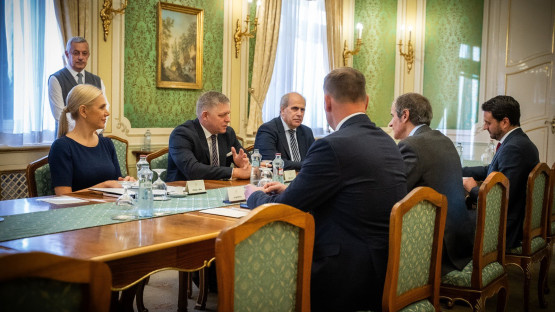The IAEA’s Director General Rafael Mariano Grossi met Slovakia’s President Zuzana Caputova and Prime Minister Robert Fico on Monday in Bratislava, to discuss Slovakia’s commitment to decarbonization through nuclear energy as well as the importance of nuclear safety and security.
IAEA Chief Meets Slovakia’s Leaders: Highlighting Commitment to Net Zero Through Nuclear Energy
IAEA Director General Rafael Mariano Grossi met Slovakia’s Prime Minister Robert Fico as well as President Zuzana Caputova. (Photo: IAEA)
Mr Grossi thanked President Caputova for her country’s steadfast support of the IAEA’s work, in particular relating to safety at the Zaporizhzhia Nuclear Power Plant (NPP) in Ukraine.
Congratulations to @ZuzanaCaputova and Slovakia on the success of the Slovak nuclear program, a cornerstone in efforts to decarbonize the economy. Thank you for the steadfast support for @IAEAorg work in #ZNPP, including the 5 principles to prevent a nuclear accident in Ukraine. pic.twitter.com/v68Nhre7pM
— Rafael Mariano Grossi (@rafaelmgrossi) November 6, 2023
Mr Grossi also met Prime Minister Fico and thanked him for a "detailed exchange" on Zaporizhzhia NPP and for his offer to support the IAEA's efforts in Ukraine.
He said, "Nuclear energy is pivotal for Slovakia’s green transition and I look forward to our continued collaboration at 2023 Nuclear Energy Summit in Brussels."
Mr Grossi’s visit to Slovakia included a trip to the country’s Mochovce NPP, with the Minister of Economy, Denisa Sakova, and the Director General of Slovenske Elektrarne, which operates the NPP, Branislav Strycek. Also in attendance was the chairperson of Nuclear Regulatory Authority of Slovakia, Marta Ziakova, reflecting Slovakia’s commitment to maintaining and strengthening its regulatory framework for nuclear and radiation safety.
„It is a success story,“ said @rafaelmgrossi today at #Mochovce #nuclear power plant. Full story: https://t.co/yaUdruUKVo pic.twitter.com/4GcRKP8sdC
— Slovenské elektrárne (@Elektrarne) November 6, 2023
Mochovce NPP is key to Slovakia’s net zero goals and has been producing even larger amounts of clean energy since January, when its Unit 3 was connected to the grid. Mochovce NPP alone prevents seven million tonnes of CO2 emissions from being released every year. In total, Slovakia now has five operational power reactors at Mochovce and Bohunice. Once Mochovce NPP’s Unit 4 is complete, the country is expected to produce 70 per cent of its electricity through nuclear energy.






